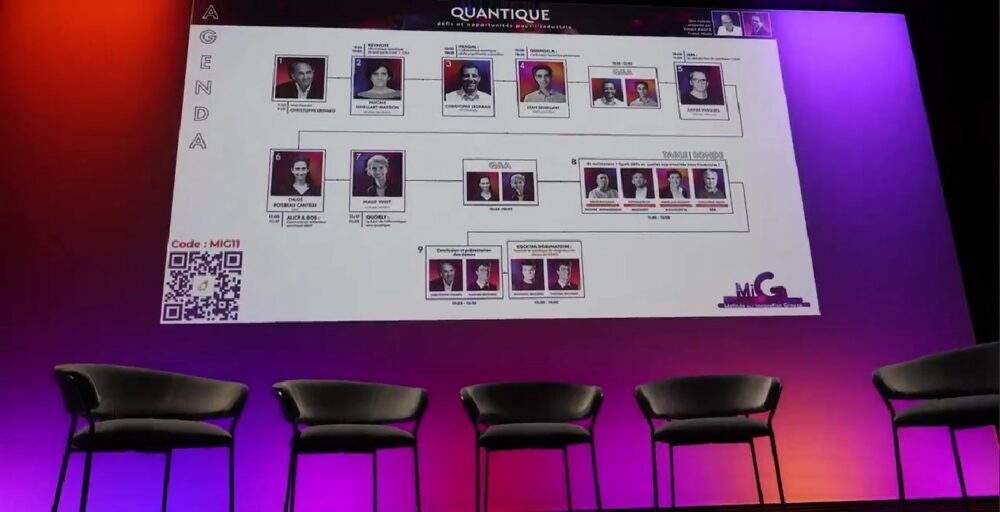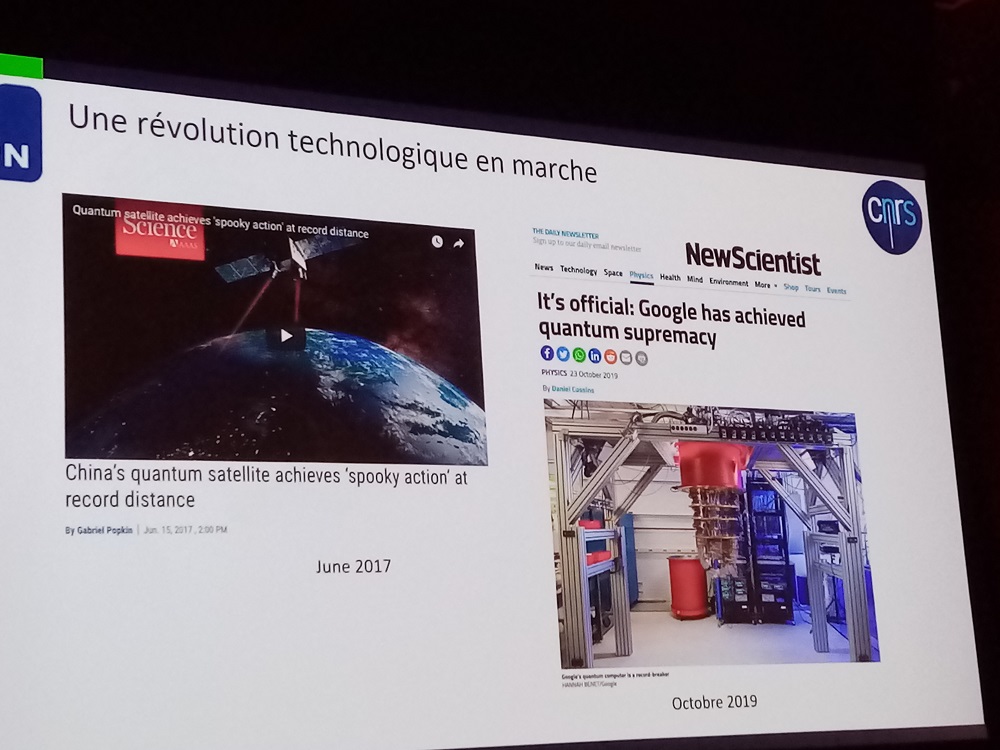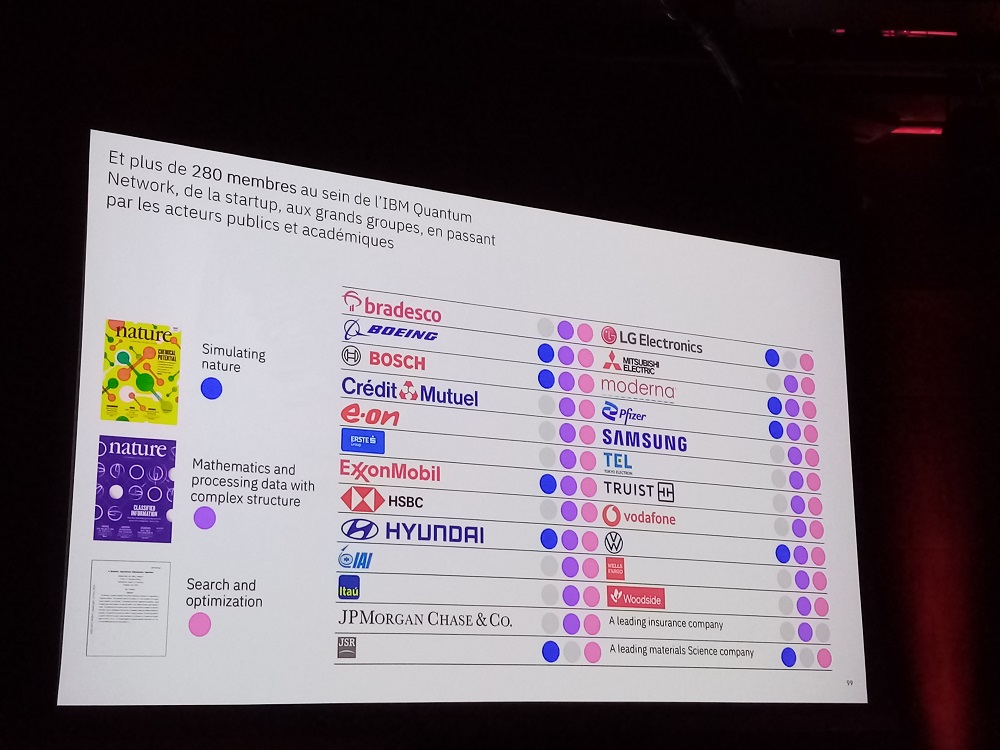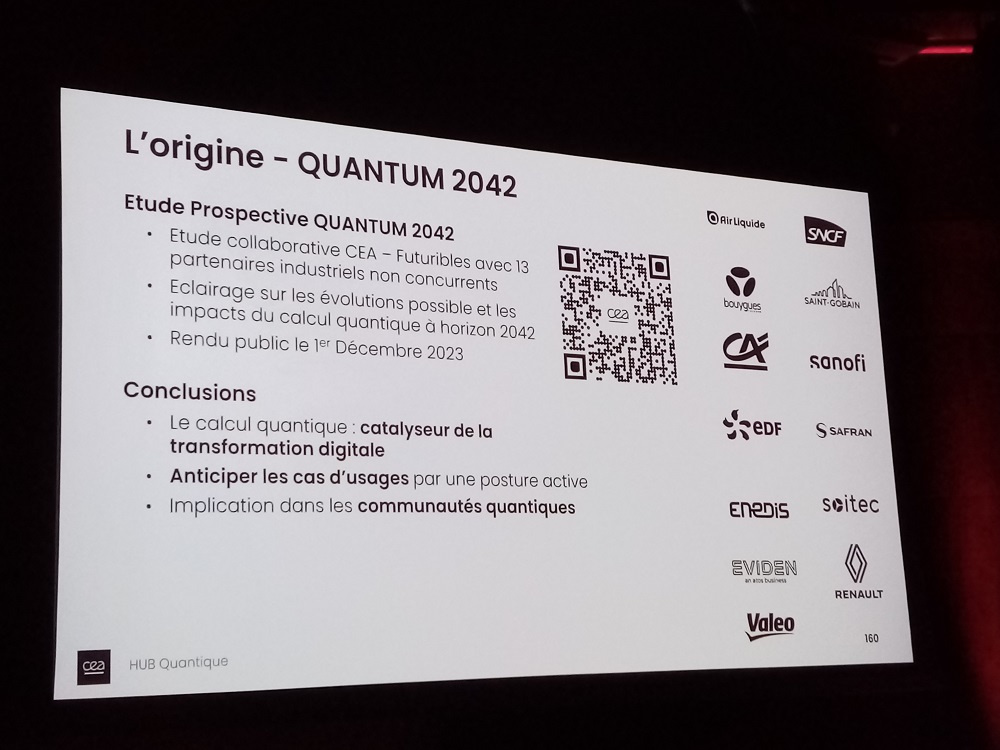💡 Quantum computing: a crucial turning point for businesses
💡 Quantum computing: a crucial turning point for businesses
The 11th Bouygues Innovation Morning, on 15 March 2024, was an opportunity for members of Futura-Mobility – invited to the event – to better understand and discover the potential of quantum computing for businesses.

But first of all, a definition for the uninitiated: ‘Quantum computing uses specialized technology — including computer hardware and algorithms that take advantage of quantum mechanics — to solve complex problems that classical computers or supercomputers can’t solve, or can’t solve quickly enough.‘ (source: IBM)
“Since 2017-2019, we have entered the second quantum revolution,” says Pascale Senellart, research director at the French National Centre for Scientific Research (CNRS) and coordinator of Quantum Paris Saclay. “It’s an ongoing technological revolution because today we are in the coherent phase and entanglement.”
Coherence is a property of quantum systems that describes their ability to maintain a stable phase relationship between different quantum states. Maintaining quantum coherence is essential if quantum computing is to reach its full potential.
Entanglement is a quantum phenomenon whereby two particles (or groups of particles) form a linked system and exhibit quantum states that depend on each other regardless of the distance separating them. It paves the way for technologies ranging from quantum sensors to quantum computers, which promise, in particular, to radically optimise processes (time, precision, and energy).
More and more qubits
“A universal quantum computer will see the light of day within the next ten years,” says Stéphane Bout, who heads McKinsey’s technology, digital and analytics competence centre in France, as well as its AI-dedicated subsidiary QuantumBlack.
The as yet unknown possibilities are certainly exciting, yet there is still a long way to go before we enter this new era of ultra-powerful computing. Quantum computing is still in the R&D phase. Researchers are looking to develop qubits – the data units used by quantum mechanics – to make them more reliable and coherent, and increase their number.
“Quantum computers will be really useful when we exceed a million qubits in total; today we are between a few dozen and a thousand,” explains Chloé Poisbeau Cantelli, COO of Alice & Bob, a French start-up developing quantum hardware since 2020. “We’ll to shift from classic computing to quantum computing, which promises to solve problems/calculations that are currently insolvable [because they would take too long].”
Investment is accelerating
Hence the growing interest from all sectors of activity: from energy, defence, transport, and logistics to communications, finance, chemicals, research, and so forth.

“We’ve been seeing an acceleration in investment in the private and public sectors for several years now, since 2017, 2018, 2019,” says Ms Senellart. An observation confirmed by Xavier Vasques, vice-president and CTO, IBM France, who reveals the tech giant “has reached a certain scale. Today, we have 38 Quantum Innovation Centres around the world and more than 281 customers, ranging in size from start-ups to big groups.”

According to Christophe Legrand, SVP global business sales at the start-up Pasqal, thanks to its computing power and lower energy consumption for equivalent demand, “quantum computing is an opportunity to solve the challenges of AI and the green transition.” Pasqal’s customers include mobility players such as Rolls Royce, Safran, Airbus, Siemens, Thales, and BMW.
The use cases for quantum computing already identified, all fields combined, offer promising prospects: optimising electrical transport networks, predictive maintenance (reducing the maintenance costs of hydroelectric dams, for instance), research into new materials, studying and improving the chemical composition of batteries, optimising taxi fleet routes, and so on.
IBM’s approach to quantum applications is based on the question: “What’s your biggest pain point today?” explains Mr Vasques, referring to one of IBM’s customers, the oil and gas company ExxonMobil, which is interested in quantum computing to alleviate “a real pain point”: optimising the paths of its cargo ships to save fuel.
Use cases for quantum computing already identified, in all fields, offer promising prospects: optimising electrical transport networks, predictive maintenance (reducing the maintenance costs of hydroelectric dams, for example), research into new materials, studying and improving the chemical composition of batteries, optimising taxi fleet routes, etc.
IBM’s approach to quantum applications is based on the question: “What is hurting you the most today?” explains Mr Vasques, referring to one of IBM’s customers, the oil and gas company ExxonMobil, which is interested in quantum computing to soothe “a real pain point”: optimising the routes of its cargo ships to save fuel.
Bouygues Telecom, for its part, is currently exploring use cases in telecommunications, especially with regards securing communications, in collaboration with its data/digital and operational units. “As a key telecommunications player, our role is to anticipate these changes, understand their implications, and adapt to them,” explains Marie-Luce Godinot, executive vice-president Innovation, Sustainable Development and Information Systems.
The Bouygues Group is especially interested in quantum sensors (used in a gravimeter to identify micromovements in underground infrastructures, for instance) because, as Ms Godinot explains, “unlike for other areas, they are set to be available more readily and show quite exceptional promise. Understanding and mastering these tools can give us a major competitive edge!”
Quantum France
France has no intention of missing out on this revolution. In 2021, the government launched a five-year Quantum Plan, with investment of €1.8 billion earmarked for academic research, structuring the ecosystem, and skills training.
Another initiative aimed at positioning the country in this field is the Quantum Hub at the CEA (French Alternative Energies and Atomic Energy Commission) in Grenoble, currently being launched by Y.Spot, a community of French players working on joint projects. This new hub aims to nuture a collaborative approach to anticipating the use cases and impacts of quantum computing over the short, medium and long term.
This hub in the making is founded on the Quantum 2042 prospective study (published in December 2023), conducted by 13 French players and the Futuribles prospective agency.

“The conclusions of the study show, firstly, that quantum computing is above all a catalyst for digital transformation, but only a catalyst,” points out Christophe Vautey, head of collaborative hubs at Y.Spot. “And secondly that, for people and industries, we need to anticipate use cases, but not only. It’s vital to take an active stance, i.e. get involved in the quantum communities that already exist or create your own.”
The time to start is now
The message is clear: quantum computing may still be in its infancy but industry needs to start thinking about it now. If businesses don’t take action, they risk being caught short and losing competitiveness, as in the field of AI. “For companies, it is important to establish a strategic approach now, decide on the level of investment, and work on use cases, because today it’s a bit like the Wild West with the race for patents,” explains Mr Bout from McKinsey.
Another aspect not to be ignored is the shortage of talent in the emerging field of quantum technology. It’s time to train your teams! On this point, Ms Godinot emphasised the importance for Group Bouygues of boosting in-house skills, particularly among its digital teams. “From now on, we need to acquire a thorough understanding and quickly adapt our teams to effectively integrate these innovations.”
For his part, Jean Senellart, chief product officer at Quandela, anticipates the need for reinforcement in certain jobs with the advent of quantum computing. “With this new tool that is quantum computing, algorithmic research will be relaunched,” he enthuses.
In the words of Mr Bout, companies should not wait. “They must start prioritising use cases, based on potential for value creation and feasibility.”
Quantum tech: what challenges & opportunities for industries?
Watch the REPLAY (in French)


